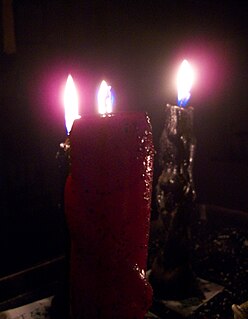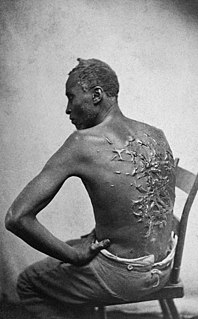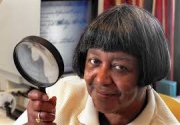Related Research Articles
In the English language, the word nigger is an ethnic slur used most often against black people, especially African Americans. Because it is considered extremely offensive, it is sometimes referred to by the euphemism "the N-word". It is also in use, particularly as the variant nigga, by African Americans among themselves. The spelling nigga reflects the pronunciation of nigger in non-rhotic dialects of English, particularly Black Vernacular English.
Spirituals is a genre of music that is "purely and solely the creation" of generations of African Americans, which merged African cultural heritage with the experiences of being held in bondage in slavery, at first during the transatlantic slave trade—the largest and most inhumane forced migration in recorded human history, and for centuries afterwards, through the domestic slave trade. Spirituals encompass the "sing songs", work songs, and plantation songs that evolved into the blues, and the gospel songs in church. In the nineteenth century, the word "spirituals" referred to all these subcategories of folk songs. While they were often rooted in biblical stories, they also described the extreme hardships endured by African Americans who were enslaved from the 17th century until the 1860s. From its roots in African music, new derivative music genres emerged from the spirituals songcraft.

Hoodoo is a set of spiritual practices, traditions, and beliefs created by African slaves in North America that were held in secret from slaveholders. Hoodoo evolved from various traditional African religions and practices, and in the American South, incorporated various elements of indigenous botanical knowledge. Hoodoo is also known as "Lowcountry Voodoo" in the Gullah South Carolina Lowcountry. Following the Great Migration of African-Americans, Hoodoo spread throughout the United States.

James Kimble Vardaman was an American politician from the U.S. state of Mississippi and was the Governor of Mississippi from 1904 to 1908. A Democrat, Vardaman was elected in 1912 to the United States Senate in the first popular vote for the office, following adoption of the 17th Amendment. He defeated incumbent LeRoy Percy, a member of the planter elite. Vardaman served from 1913 to 1919.

Slavery in the United States was the legal institution of human chattel slavery, primarily of Africans and African Americans, that existed in the United States of America from its founding in 1776 until the passage of the Thirteenth Amendment in 1865. Slavery was established throughout European colonization in the Americas. From early colonial days, it was practiced in Britain's colonies, including the Thirteen Colonies which formed the United States. Under the law, an enslaved person was treated as property and could be bought, sold, or given away. Slavery lasted in about half of U.S. states until 1865. As an economic system, slavery was largely replaced by sharecropping and convict leasing.

"Children of the plantation" was a euphemism used during the time of slavery in the United States, to identify the offspring of slave Black women with White men, usually the owner or one of his sons or the plantation overseer.
An African American is a citizen or resident of the United States who has origins in any of the black populations of Africa. African American-related topics include:

Henrietta Vinton Davis was an African-American elocutionist, dramatist, and impersonator. In addition to being "the premier actor of all nineteenth-century black performers on the dramatic stage", Davis was proclaimed by Marcus Garvey to be the "greatest woman of the Negro race today".
Little is known about the exact origin of the music now known as the blues. No specific year can be cited as the origin of the blues, largely because the style evolved over a long period and existed in approaching its modern form before the term blues was introduced and before the style was thoroughly documented. Ethnomusicologist Gerhard Kubik traces the roots of many of the elements that were to develop into the blues back to the African continent, the "cradle of the blues". One important early mention of something closely resembling the blues comes from 1901, when an archaeologist in Mississippi described the songs of black workers which had lyrical themes and technical elements in common with the blues.

A house slave was a slave who worked, and often lived, in the house of the slave-owner, performing domestic labor. House slaves had many duties such as cooking, cleaning, serving meals, and caring for children.

The Slave Community: Plantation Life in the Antebellum South is a book written by American historian John W. Blassingame. Published in 1972, it is one of the first historical studies of slavery in the United States to be presented from the perspective of the enslaved. The Slave Community contradicted those historians who had interpreted history to suggest that African-American slaves were docile and submissive "Sambos" who enjoyed the benefits of a paternalistic master–slave relationship on southern plantations. Using psychology, Blassingame analyzes fugitive slave narratives published in the 19th century to conclude that an independent culture developed among the enslaved and that there were a variety of personality types exhibited by slaves.
The essay "Occasional Discourse on the Negro Question" was written by the British essayist Thomas Carlyle about the acceptability of using black slaves and indentured servants. It was first anonymously published as an article in Fraser's Magazine for Town and Country of London in December 1849, and was reprinted as a pamphlet four years later with the title, "Occasional Discourse on the Nigger Question". The essay was the spark of a debate between Carlyle and John Stuart Mill.
In the English language, negro is a term historically used to denote persons considered to be of Black African heritage. The term can be construed as offensive, inoffensive, or completely neutral, largely depending on the region or country where it is used. It has various equivalents in other languages of Europe.

"Message to the Grass Roots" is a public speech delivered by human rights activist Malcolm X. The speech was delivered on November 10, 1963, at the Northern Negro Grass Roots Leadership Conference, which was held at King Solomon Baptist Church in Detroit, Michigan. Malcolm X described the difference between the "Black revolution" and the "Negro revolution", he contrasted the "house Negro" and the "field Negro" during slavery and in the modern age, and he criticized the 1963 March on Washington. "Message to the Grass Roots" was ranked 91st in the top 100 American speeches of the 20th century by 137 leading scholars of American public address.

Slavery in Virginia dates to 1619, soon after the founding of Virginia as an English colony by the London Virginia Company. The company established a headright system to encourage colonists to transport indentured servants to the colony for labor; they received a certain amount of land for people whose passage they paid to Virginia.
Buckra is a term primarily used by the Gullah people in the Southeast United States to describe a white man. It derives from the Efik word mbakara, meaning 'European, master'.

A plantation complex in the Southern United States is the built environment that was common on agricultural plantations in the American South from the 17th into the 20th century. The complex included everything from the main residence down to the pens for livestock. Southern plantations were generally self-sufficient settlements that relied on the forced labor of enslaved people.

The treatment of enslaved people in the United States varied by time and place, but was generally brutal, especially on plantations. Whipping and rape were routine, but usually not in front of white outsiders, or even the plantation owner's family. An enslaved person could not be a witness against a white; enslaved people were sometimes required to whip other enslaved people, even family members. There were also businesses to which a slave owner could turn over the whipping. Families were often split up by the sale of one or more members, usually never to see or hear of each other again. There were some relatively enlightened slave owners—Nat Turner said his master was kind—but not on large plantations. Only a small minority of enslaved people received anything resembling decent treatment; one contemporary estimate was 10%, not without noting that the ones well treated desired freedom just as much as those poorly treated. Good treatment could vanish upon the death of an owner. As put by William T. Allan, a slaveowner's abolitionist son who could not safely return to Alabama, "cruelty was the rule, and kindness the exception".

"Niggers in the White House" is a poem that was published in newspapers around the United States between 1901 and 1903. The poem was written in reaction to an October 1901 White House dinner hosted by Republican President Theodore Roosevelt, who had invited Booker T. Washington—an African-American presidential adviser—as a guest. The poem reappeared in 1929 after First Lady Lou Hoover, wife of President Herbert Hoover, invited Jessie De Priest, the wife of African-American congressman Oscar De Priest, to a tea for congressmen's wives at the White House. The identity of the author—who used the byline "unchained poet"—remains unknown.

Agnes Kane Callum was a genealogist known for her research into Maryland's African-American history. She was a founding member of the Baltimore Afro-American Historical and Genealogical Society, a frequent columnist for The Catholic Review, and the founding editor of a black genealogical journal, Flower of the Forest. Callum was inducted into the Maryland Women's Hall of Fame in 2014.
References
- 1 2 "House". Oxford English Dictionary. Second Edition on CD-ROM (v. 4.0). Oxford University Press. 2009. ISBN 978-0-19-956383-8.
- ↑ "Extracts from the Carroll Papers". Maryland Historical Magazine. Maryland Historical Society. XIV (2): 135. June 1919. Retrieved January 18, 2018.
- ↑ Report of the Committee of the African Institution. London: William Phillips, George Yard, Lombard Street. 1807.
- ↑ Mitchell, Margaret (1936). Gone With The Wind. Macmillan.
- ↑ Malcolm X (1990) [1965]. George Breitman (ed.). Malcolm X Speaks . New York: Grove Weidenfeld. pp. 10–12. ISBN 0-8021-3213-8.
- ↑ "Obama a 'house negro', says Al-Qaeda". Sydney Morning Herald. November 21, 2008.
- ↑ "Black Group Condemns Cartoonist for Racist Strip About Condoleezza Rice". Project 21 press release. July 19, 2004.
- ↑ James, Darryl. "The Bridge: In the House". Blacknla.com.
- ↑ Roche, Kathi Roche. "The Secretary: Capitalism's House Nigger". Women's Liberation Movement on-line archival collection, Special Collections Library. Duke University.
- ↑ Danya Levy; Kate Chapman (September 6, 2012). "Harawira's N-bomb directed at National MPs". Fairfax NZ.
- ↑ "Bill Maher Drops the N-Word on 'Real Time,' Sen. Ben Sasse Laughs". thedailybeast.com. March 6, 2017.
- ↑ Dave Itzkoff (June 3, 2017). "Bill Maher Apologizes for Use of Racial Slur on 'Real Time'". New York Times . Archived from the original on June 11, 2017. Retrieved June 11, 2017.
Mr. Maher said: "Work in the fields? Senator, I'm a house nigger. No, it's a joke."
- ↑ Dan O'Donnell. "State Sen. Lena Taylor Cited for Disorderly Conduct'".